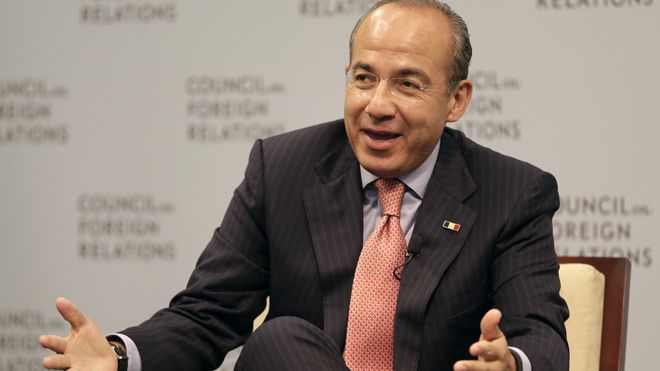For centuries, Harvard Yard has been a safe haven for aspiring minds, intellectuals and world leaders who come to teach, study and learn in peace.
But former Mexican President Felipe Calderón may not find much serenity during his time on campus.
The controversial former Mexican leader has yet to begin his one-year teaching appointment at the Kennedy School of Government and already he faces opposition from groups on both sides of the border.
The online petition site Change.Org has collected nearly 33,000 signatures in opposition to Harvard’s appointment of Calderón. And Mexican political activist and poet Javier Sicilia sent a letter to the university, calling the former president’s appointment an affront to the victims of the bloodshed in Mexico.
These appointments are almost always controversial, but this one is even more so given the number of deaths in Mexico.
– Monica Rankin, an assistant professor of history at the University of Texas at Dallas.
“We believe … that the appointment of President Calderón as a visiting fellow at the Kennedy school, is an insult to the victims of violence in Mexico,” Sicilia and Mexican academic Sergio Aguayo wrote in a joint letter to the Kennedy School’s Dean David Ellwood.
During Calderón’s six years in office, an estimated 70,000 people died in violence related to the country’s ongoing drug war. An escalation in murders and other violent crimes arose soon after Calderón took office in 2006, when he declared an all-out military blitz on Mexico’s drug cartels.
Besides the death toll, Mexico’s cartels – and with them, violence – have spread from certain regions along the U.S.-Mexico border to other parts of the country once free of violence, including resort areas such as Acapulco and metropolitan hubs like Monterrey and Guadalajara.
The Kennedy School defended its appointment of Calderón, arguing that as an educational institution it welcomes varying view points and theories.
“The School has a long tradition of providing an opportunity for leaders from around the world to speak to and interact with the community on important public policy issues,” Ellwood said in a statement.
“The unique opportunity to engage in direct discussion with a former head of state is one that many of our students value greatly, even if they may disagree with some of that leader’s policy positions,” Ellwood said.
Some academics argue that appointments of former world leaders at U.S universities is always divisive — such as Georgetown’s appointment of former Colombian President Alvaro Uribe — but Calderon’s hiring is even more poignant given the human rights crisis in Mexico.
“This one is even more so given the number of deaths in Mexico,” said Monica Rankin, an assistant professor of history at the University of Texas at Dallas.
Rankin added that these types of movements against former world leaders will become more common in the future given the advent of social media and the ease at which information can spread.
Despite Calderón’s controversial human rights record while in office, some academics defended the Kennedy School’s decision and called it a good learning opportunity for students at Harvard.
“An academic community should be open to all points of view,” George Grayson, a government professor at The College of William & Mary, told Fox News Latino vía e-mail.
“[Calderon] managed the drug war poorly, but that is a subject he can discuss with students and faculty at Harvard,” Grayson added.[FOX]


